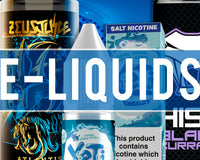Introduction:
Vaping has become a popular alternative to traditional smoking, with many individuals adopting e-cigarettes as a seemingly safer option. However, concerns have been raised about the potential health risks associated with vaping, including the question of whether it can cause cancer. In this article, we will delve into the scientific research to examine the possible links between vaping and cancer.
The Components of Vaping Liquids:
Vaping liquids, commonly known as e-liquids or vape juice, typically consist of a combination of propylene glycol, vegetable glycerine, nicotine, and flavourings. While these ingredients are generally recognized as safe for ingestion, the effects of inhaling them into the lungs are still under investigation.
The Role of Harmful Chemicals:
One of the main concerns regarding vaping and cancer is the presence of harmful chemicals produced during the heating and aerosolization of e-liquids. Studies have identified certain chemicals, such as formaldehyde and acrolein, in the vapor produced by e-cigarettes. These substances are known to be carcinogenic and may pose a risk when inhaled over an extended period.
Nicotine and its Connection to Cancer:
Nicotine, a highly addictive substance found in traditional cigarettes and many vaping products, is not a known carcinogen. However, it can contribute to the development of cancer indirectly. Nicotine stimulates the release of adrenaline, which can increase heart rate and blood pressure. Prolonged exposure to high levels of adrenaline may promote the growth of tumours and increase the risk of cancer.
Limited Long-Term Studies:
It's essential to note that the long-term health effects of vaping are still not fully understood. While some studies have suggested potential risks, the majority of research is relatively recent, and the true impact of vaping on cancer rates may only become clear with more extended, comprehensive studies.
Regulatory Measures and Product Safety:
To mitigate potential health risks, regulatory measures have been implemented to monitor the manufacturing and sale of vaping products. However, the market remains dynamic, with new products constantly emerging. Users are advised to choose reputable brands, adhere to product safety guidelines, and stay informed about any updates in regulations. One way to check if a product ad hears to the UK legislation is by checking the ECID number on the packaging. If you enter the ECID number on Vape-click.com this will tell you if the product is safe to vape or not. If the product does not have an ECID number on the packaging then this product poses a higher risk of causing potential harm to you as it is not a legal product, and has not registered it's product with the MHRA (Medical and Healthcare Products Regulatory Agency UK).
Conclusion:
While the scientific community continues to investigate the potential links between vaping and cancer, it is crucial to approach the topic with caution. Current evidence suggests that vaping may expose users to harmful chemicals, some of which are associated with cancer. As research evolves, it is essential for individuals to stay informed about the latest findings and consider the potential health risks before engaging in vaping as an alternative to traditional smoking.




